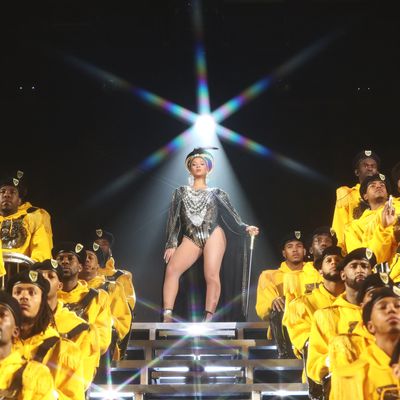
I love live albums. Whenever I tell this to people, they don’t really know what to think. As a concept, live albums seem to have been somewhat maligned as people became savvy to the fact that they aren’t just recordings of concerts but are, in fact, produced to sound as good as possible. But I do not care. Work me all you want: A show is a show, folks. And were it not for my beloved collection of live albums, I don’t know how I’d push through the cavernous abyss awaiting me mentally in this, the cursed return of March. I need music that’s not only good but is also thrilling. I need a show with a dramatic arc. I need the roar of a crowd and the witty banter of a lead singer to take me to a place and time that is not here. All that and more are what make live albums the best and most culturally important type of album.
Live albums are often treated like a bonus for an artist’s die-hard fans, and they are. You’re supposed to already know most of the songs, and these “live versions” are simply additions to your collection. But, if an artist is doing things right, live albums will actually have better, updated versions of almost every song and include treats. Garth Brooks’s “Friends in Low Places” has a secret third verse usually sung by an extremely drunk audience, and it’s so good I can’t even care about the studio version. Ani Difranco’s “Out of Range” should feel like she and the entire audience are having angry sex. And “25 Minutes to Go” is just a clever song until Johnny Cash sings it to hundreds of actual prisoners. These aren’t just live versions of songs, these are songs that are — sorry, this is about to get corny — alive.
There are a lot of people who can talk more knowledgeably than I about what streaming has done to the way we relate to an artist’s work, but I think I understand the toll it’s taken on the concept of an album as an experience. It took Beyoncé almost getting a whole divorce for me to be reminded that albums can be more than a collection of singles. Lemonade told a story, from beginning to end, in a way only the best studio albums do. But every live album does this. Homecoming (which is, in my opinion, the last great live album) is the story of Beyoncé coming to Coachella to perform a celebration of her whole career. It’s an album that’s also a historical event, a retrospective on decades of work by the woman who made it, a permanent ascendency to the status of a living legend. But a live album doesn’t have to be a big, iconic, career-defining moment to be an artist’s most unforgettable work.
Consider the MTV Unplugged series, which was, on its face, just a TV show where artists performed live and mostly acoustically. But this simple formula resulted in some of the most memorable performances by artists like Lauryn Hill, Eric Clapton, and Mariah Carey. It gave us the only Nirvana album to win a Grammy (if you care about stuff like that), but it’s also my favorite Nirvana album because before I even understood Kurt Cobain’s legacy I was listening to this man be nervously self-deprecating between songs, and I felt like I got him immediately. Unplugged also gave us a now-legendary set by my very favorite band Oasis, where Noel Gallagher had to sing all the songs because Liam, then the lead singer of the biggest band in the world, had laryngitis. This is the kind of delicious madness that only a live show can generate. This is real life, baby, and we simply must live through it. (While the band didn’t release the set as an album like other artists did — aside from one track they added to a 2014 rerelease of (What’s the Story) Morning Glory — bootlegs of it have been passed around the internet by fans for years, and — sorry, Liam — it is actually my favorite Oasis album.)
The best thing about a concert, to me, is that it’s a completely intimate, individual experience that happens communally. I’ve shouted along to songs with friends at shows only to find out the song itself means something wholly different to both of us. It’s a form of communication that goes beyond anything verbal: As American K-Pop stans know, understanding all of the lyrics isn’t even the point. A musician performs a song to share something that goes beyond words; a listener uses the song to interpret their own feelings, and we, as a community, celebrate our shared ability to do this. To perform and to listen. To understand and to feel understood. I’m no audiophile, but I do believe there are ways music is best experienced. And one of them is the way humans developed it: artist and audience, together. A studio album allows for this on some level: You can certainly sit and listen to a song by yourself, recorded by an artist who was at some point in a room off by themselves, and feel something. You can also masturbate, but we all know it’s just not the same as doing it with other people. The best version of your favorite song is always the one where the band plays the first chord and the crowd goes wild, because that is the moment when you know you have a million friends who are perfect strangers.
I hope when live shows return, more artists start releasing live albums. There’s a part of me that wants to believe we’ll suddenly appreciate concerts more intensely, now that we realize they could evaporate at any moment. But also, maybe we’ll just want to bottle all of them up and save them for future generations who’re just discovering Lady Gaga but can never attend a Lady Gaga concert. Among the endless screens and streams in which we exist right now, it’s easy to feel siloed in your own little corner of the internet, for other people to feel almost hypothetical — simply something to read about or watch. But I hope that soon, instead of just reading about how popular an Olivia Rodrigo song is, I’ll be listening to 10,000 crying people singing along to “drivers license.” And that’s the moment when I’ll really get it.


